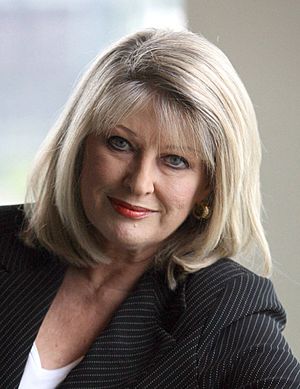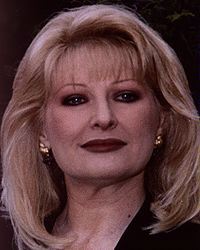Helen Coonan facts for kids
Quick facts for kids
Helen Coonan
|
|
|---|---|

Official portrait, 2008
|
|
| Minister for Communications, Information Technology and the Arts | |
| In office 18 July 2004 – 3 December 2007 |
|
| Prime Minister | John Howard |
| Preceded by | Daryl Williams |
| Succeeded by | Stephen Conroy |
| Minister for Revenue and Assistant Treasurer | |
| In office 26 November 2001 – 18 July 2004 |
|
| Prime Minister | John Howard |
| Preceded by | Rod Kemp |
| Succeeded by | Mal Brough |
| Senator for New South Wales | |
| In office 1 July 1996 – 22 August 2011 |
|
| Succeeded by | Arthur Sinodinos |
| Personal details | |
| Born |
Helen Lloyd Coonan
29 October 1947 Mangoplah, New South Wales |
| Political party | Liberal Party of Australia |
| Spouse | Andrew Rogers |
| Occupation | Barrister/solicitor |
Helen Lloyd Coonan (born 29 October 1947) is a former Australian politician. She was a Senator for New South Wales from 1996 to 2011. She represented the Liberal Party.
Helen Coonan also served as a minister in the Australian government. She was the Minister for Revenue and Assistant Treasurer from 2001 to 2004. Later, she became the Minister for Communications, Information Technology and the Arts from 2004 to 2007.
Contents
Early Life and Education
Helen Coonan was born in Mangoplah, New South Wales. She went to a Catholic boarding school in Wagga Wagga.
She later studied at the University of Sydney. There, she earned a degree in law. Before becoming a politician, she worked as a lawyer.
Political Career
In 1996, Helen Coonan was elected to the federal Senate. She represented New South Wales as a Liberal senator. She was re-elected in 2001.
Minister for Revenue and Assistant Treasurer
From 2001 to 2004, Helen Coonan served as the Minister for Revenue and Assistant Treasurer. She was the first woman to hold a Treasury role in Australia.
In this role, she helped create the Inspector-General of Taxation. This new position provided advice to the government. It aimed to help taxpayers.
Minister for Communications, Information Technology and the Arts
In July 2004, Helen Coonan became the Minister for Communications, Information Technology and the Arts. This was a very important job. She was in charge of Australia's TV, radio, and internet industries. She also looked after the arts and Australia Post.
In January 2006, she became the Deputy Leader of the Government in the Senate. She was the first woman in this leadership role for her political group.
Digital Television Transition
When Helen Coonan became minister, Australia was changing from old analogue TV to digital television. The plan was to switch off analogue TV completely.
In 2005, she announced a review of this change. The government had spent a lot of money to help people switch. However, not many people had adopted digital TV yet.
She helped create Digital Australia. This was a new government group. Its job was to help manage the switch to digital TV.
Digital Radio Development
In October 2005, Helen Coonan also shared a plan for Digital Audio Broadcasting (DAB) radio. This new digital radio would start in big cities. There were no plans to stop analogue radio.
Media Ownership Changes
Helen Coonan played a key role in changing laws about media ownership. These changes made it easier for one company to own different types of media. For example, a company could own both TV stations and newspapers.
Internet Safety Initiatives
Helen Coonan also worked on internet safety. In 2007, she announced a large funding package for the NetAlert program. This program aimed to help filter internet content for families.
The goal was to make the internet safer for children. This program was designed to filter content at the internet service provider (ISP) level.
After Parliament
Helen Coonan left the Senate on August 22, 2011. After leaving politics, she joined the board of a gaming company called Crown Limited.
She also became a member of an advisory group for an investment bank, J.P. Morgan & Co.. She has also been a trustee of the Sydney Opera House Trust.
In 2018, she became the chair of the Australian Financial Complaints Authority. In 2019, she took over as chair of the Minerals Council of Australia.
 | John T. Biggers |
 | Thomas Blackshear |
 | Mark Bradford |
 | Beverly Buchanan |


